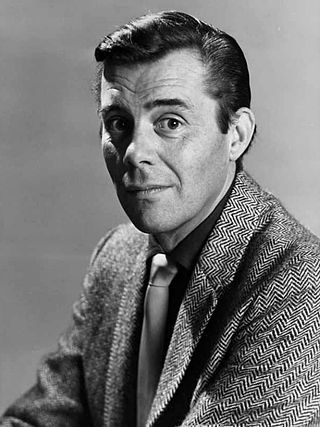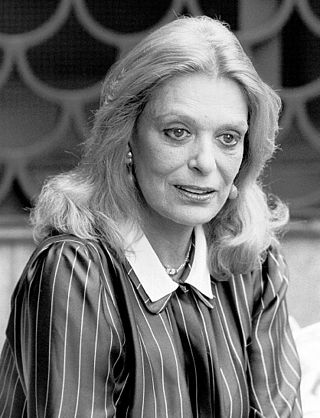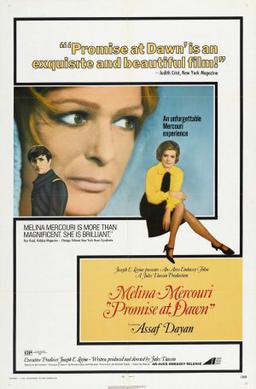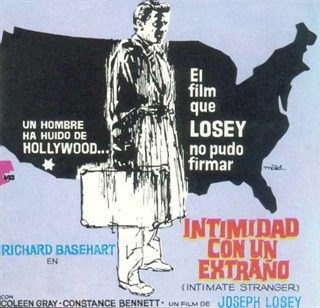
Topkapi is a 1964 American Technicolor heist film produced by Filmways Pictures and distributed by United Artists.

Joseph Walton Losey III was an American theatre and film director, producer, and screenwriter. Born in Wisconsin, he studied in Germany with Bertolt Brecht and then returned to the United States. Blacklisted by Hollywood in the 1950s, he moved to Europe where he made the remainder of his films, mostly in the United Kingdom. Among the most critically and commercially successful were the films with screenplays by Harold Pinter: The Servant (1963) and The Go-Between (1971).

Sir Dirk Bogarde was an English actor, novelist and screenwriter. Initially a matinée idol in films such as Doctor in the House (1954) for the Rank Organisation, he later acted in art house films, evolving from "heartthrob to icon of edginess".

Maria Amalia "Melina" Mercouri was a Greek actress, singer, activist, and politician. She came from a political family that was prominent over multiple generations. She received an Academy Award nomination and won a Cannes Film Festival Best Actress Award for her performance in the film Never on Sunday (1960). Mercouri was also nominated for one Tony Award, three Golden Globes and two BAFTA Awards in her acting career. In 1987 she was awarded a special prize in the first edition of the Europe Theatre Prize.

Accident is a 1967 British drama film directed by Joseph Losey. Written by Harold Pinter, it is an adaptation of the 1965 novel Accident by Nicholas Mosley. It is the third of four Losey–Pinter collaborations; the others being The Servant (1963), Modesty Blaise (1966) and The Go-Between (1971). At the 1967 Cannes Film Festival, Accident won the Grand Prix Spécial du Jury award. It also won the Grand Prix of the Belgian Film Critics Association.

The Servant is a 1963 British drama film directed by Joseph Losey. It was written by Harold Pinter, who adapted Robin Maugham's 1948 novella. The Servant stars Dirk Bogarde, Sarah Miles, Wendy Craig and James Fox. It opened at London's Warner Theatre on 14 November 1963.

Keith Joseph Michell was an Australian actor who worked primarily in the United Kingdom, and was best known for his television and film portrayals of King Henry VIII. He appeared extensively in Shakespeare and other classics and musicals in Britain, and was also in several Broadway productions. He was an artistic director of the Chichester Festival Theatre in the 1970s and later had a recurring role on Murder, She Wrote as the charming thief Dennis Stanton. He was also known for illustrating a collection of Jeremy Lloyd's poems Captain Beaky, and singing the title song from the associated album.

Modesty Blaise is a 1966 British spy-fi comedy film directed by Joseph Losey, produced by Joseph Janni, and loosely based on the popular comic strip Modesty Blaise by Peter O'Donnell, who co-wrote the original story upon which Evan Jones and Harold Pinter based their screenplay. It stars Monica Vitti as "Modesty", opposite Terence Stamp as Willie Garvin and Dirk Bogarde as her nemesis Gabriel. The cast also includes Harry Andrews, Michael Craig, Alexander Knox, Rossella Falk, Clive Revill, and Tina Aumont. The film's music was composed by Johnny Dankworth and the theme song, Modesty, sung by pop duo David and Jonathan. It was Vitti's first English-speaking role.

The Go-Between is a 1971 British historical drama film directed by Joseph Losey. Its screenplay by Harold Pinter is an adaptation of the 1953 novel The Go-Between by L. P. Hartley. The film stars Julie Christie, Alan Bates, Margaret Leighton, Michael Redgrave and Dominic Guard. It won the Palme d'Or at the 1971 Cannes Film Festival.

The Criminal is a 1960 British neo-noir crime film directed by Joseph Losey and starring Stanley Baker, Sam Wanamaker, Grégoire Aslan, Jill Bennett, and Margit Saad. Baker plays Johnny Bannion, a recently-paroled gangster who is sent back to prison after robbing a racetrack, with both the authorities and the criminal underworld looking for the money.
June Laverick is an English film, television and stage actress.

King and Country is a 1964 British war film directed by Joseph Losey, shot in black and white, and starring Dirk Bogarde and Tom Courtenay. The film was adapted for the screen by British screenwriter Evan Jones based on the play Hamp by John Wilson and a 1955 novel by James Lansdale Hodson.

Promise at Dawn is a 1970 American drama film directed by Jules Dassin and starring Melina Mercouri, Dassin's wife. It is based on the 1960 novel Promise at Dawn by Romain Gary and the subsequent play by Samuel A. Taylor.

The Sleeping Tiger is a 1954 British film noir directed by Joseph Losey and starring Alexis Smith, Dirk Bogarde and Alexander Knox. It was Losey's first British feature, which he directed under the pseudonym of Victor Hanbury due to being blacklisted in the McCarthy Era. It was shot at Walton Studios and on location in London. The film's sets were designed by the art director John Stoll. It was released by Anglo-Amalgamated while in America it was distributed by Astor Pictures.

The Captain's Table is a 1959 British comedy film directed by Jack Lee based upon a novel by Richard Gordon. It stars John Gregson, Donald Sinden, Peggy Cummins and Nadia Gray, and featured Maurice Denham, Joan Sims, John Le Mesurier, Richard Wattis and Reginald Beckwith in leading supporting roles.

Galileo is a 1975 biographical film about the 16th- and 17th-century scientist Galileo Galilei, whose astronomical observations with the newly invented telescope led to a profound conflict with the Roman Catholic Church. The film is an adaptation of Bertolt Brecht's 1943 play of the same name. The film was produced by Ely Landau for the American Film Theatre, which presented thirteen film adaptations of plays in the United States from 1973 to 1975. Brecht's play was recently called a "masterpiece" by veteran theater critic Michael Billington, as Martin Esslin had in 1960. The film's director, Joseph Losey, had also directed the first performances of the play in 1947 in the US — with Brecht's active participation. The film is fairly true to those first performances, and is thus of historical significance as well.
Earl St. John was an American film producer in overall charge of production for The Rank Organisation at Pinewood Studios from 1950 to 1964, and was credited as executive producer on 131 films. He was known as the "Earl of Pinewood". John Davis of Rank called him "the greatest showman that The Rank Organisation has ever had, and probably the greatest showman to have lived in this country. "

The Intimate Stranger is a 1956 British film noir drama film directed by Joseph Losey, and starring Richard Basehart, Mary Murphy, Constance Cummings and Roger Livesey. It was released in the U.S. as Finger of Guilt.

The High Bright Sun is a 1964 British action film directed by Ralph Thomas and starring Dirk Bogarde, George Chakiris and Susan Strasberg. It is set in Cyprus during the EOKA uprising against British rule in the 1950s. It was based on a 1962 novel by Ian Stuart Black.
Reginald Beck was a British film editor with forty-nine credits from 1932 to 1985. He is noted primarily for films done with Laurence Olivier in the 1940s and with Joseph Losey in the 1960s and 1970s.

















